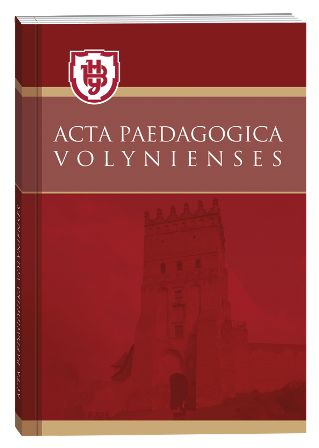FORMATION OF PROFESSIONAL LANGUAGE-COMMUNICATIVE COMPETENCE OF FUTURE PRIMARY SCHOOL TEACHERS IN THE PROCESS OF STUDYING THE EDUCATIONAL COMPONENT “MODERN UKRAINIAN LANGUAGE WITH PRACTICE”
DOI:
https://doi.org/10.32782/apv/2023.1.10Keywords:
professional linguistic and communicative competence, culture of communication, language, speech, communicative abilities, professional training, primary education specialistAbstract
The article is devoted to the current problem of the formation of professional linguistic and communicative competence of the future specialist in primary education. The new Ukrainian school needs completely new teachers. A modern teacher is primarily a nationally conscious, spiritually rich individual who possesses the skills and abilities to freely and appropriately use language tools in all types of speech activity, i.e. provides an appropriate level of communicative competence – one of the key components of a teacher’s professional competence. Undoubtedly, only a teacher who successfully possesses speaking skills determines the potential of the entire education system, the degree of its influence on the development of the student’s personality. Taking the research of scientists as a basis, we understand the communicative professional competence of a teacher as an integrated personal quality that involves systematized knowledge of language as the highest asset of civilization; knowledge of the rules of language communication; knowledge of the norms of the modern Ukrainian literary language, the ability and skills of optimal use of this knowledge in professional communication, the ability to reflect, a developed “sense of language”. It was determined that professional linguistic and communicative competence is an integrative phenomenon that encompasses a whole range of special abilities, knowledge, abilities, skills, strategies and tactics of language behavior, attitudes for successful implementation of speech activity in specific communication conditions. This type of competence is characteristic of a highly educated, cultured person, a well-formed personality. Linguistic and communicative competence consists of phonological, orthographic, orthographic, lexical, grammatical and punctuation.
References
Вижимова Т. Комунікативна культура учителя як основа його діяльності. Мовна підготовка вчителя. Наука і освіта, 2000. № 5.
Гриценко Т. Б. Українська мова та культура мовлення : Навчальний посібник для студентів аграрних вищих навчальних закладів та коледжів. Київ: Центр навчальної літератури, 2005. 356 с.
Климова К. Я. Формування мовнокомунікативної професійної компетентності студентів нефілологічних спеціальностей педагогічних університетів : автореф. дис.... докт. пед. наук : 13.00.02 Київ, 2011. 35 с.
Компетентнісний підхід у сучасній освіті: світовий досвід та українські перспективи : Бібліотека з освітньої політики / за заг. ред. О. В. Овчарук. Київ: «К.І.С.», 2004. 112 с.
Онопрієнко О. Концептуальні засади компетентнісного підходу в сучасній освіті. Шлях освіти. 2007. № 4. С. 32–37.







